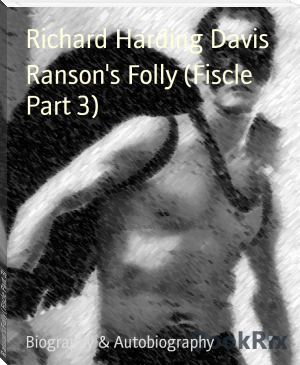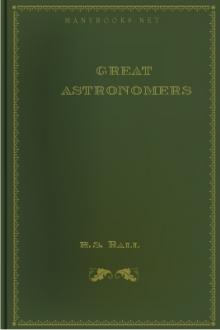A Publisher And His Friends (Fiscle Part-4) by Samuel Smiles (essential books to read .txt) 📕

- Author: Samuel Smiles
Book online «A Publisher And His Friends (Fiscle Part-4) by Samuel Smiles (essential books to read .txt) 📕». Author Samuel Smiles
We Have Already Seen That Mr. Murray Had Some Correspondence With Thomas
Campbell In 1806 Respecting The Establishment Of A Monthly Magazine;
Such An Undertaking Had Long Been A Favourite Scheme Of His, And He Had
Mentioned The Subject To Many Friends At Home As Well As Abroad. When,
Therefore, Mr. Blackwood Started His Magazine, Murray Was Ready To Enter
Into His Plans, And Before Long Announced To The Public That He Had
Become Joint Proprietor And Publisher Of Blackwood's _Edinburgh
Magazine_.
There Was Nothing Very Striking In The Early Numbers Of The _Magazine_,
And It Does Not Appear To Have Obtained A Considerable Circulation. The
First Editors Were Thomas Pringle, Who--In Conjunction With A
Friend--Was The Author Of A Poem Entitled "The Institute," And James
Cleghorn, Best Known As A Contributor To The _Farmers' Magazine_.
Constable, Who Was Himself The Proprietor Of The _Scots Magazine_ As
Well As Of The _Farmers' Magazine_, Desired To Keep The Monopoly Of The
Scottish Monthly Periodicals In His Own Hands, And Was Greatly Opposed
To The New Competitor. At All Events, He Contrived To Draw Away From
Blackwood Pringle And Cleghorn, And To Start A New Series Of The _Scots
Magazine_ Under The Title Of The _Edinburgh Magazine_. Blackwood
Thereupon Changed The Name Of His Periodical To That By Which It Has
Since Been So Well Known. He Undertook The Editing Himself, But Soon
Obtained Many Able And Indefatigable Helpers.
There Were Then Two Young Advocates Walking The Parliament House In
Search Of Briefs. These Were John Wilson (Christopher North) And John
Gibson Lockhart (Afterwards Editor Of The _Quarterly_). Both Were
West-Countrymen--Wilson, The Son Of A Wealthy Paisley Manufacturer, And
Chapter 18 (Alliance With Blackwood--Blackwood's "Edinburgh Magazine"--Termination Of Partnership) Pg 2Lockhart, The Son Of The Minister Of Cambusnethan, In Lanarkshire--And
Both Had Received The Best Of Educations, Wilson, The Robust Christian,
Having Carried Off The Newdigate Prize At Oxford, And Lockhart, Having
Gained The Snell Foundation At Glasgow, Was Sent To Balliol, And Took A
First Class In Classics In 1813. These, With Dr. Maginn--Under The
_Sobriquet_ Of "Morgan O'dogherty,"--Hogg--The Ettrick Shepherd,--De
Quincey--The Opium-Eater,--Thomas Mitchell, And Others, Were The
Principal Writers In _Blackwood_.
No. 7, The First Of The New Series, Created An Unprecedented Stir In
Edinburgh. It Came Out On October 1, 1817, And Sold Very Rapidly, But
After 10,000 Had Been Struck Off It Was Suppressed, And Could Be Had
Neither For Love Nor Money. The Cause Of This Sudden Attraction Was An
Article Headed "Translation From An Ancient Chaldee Manuscript,"
Purporting To Be An Extract From Some Newly Discovered Historical
Document, Every Paragraph Of Which Contained A Special Hit At Some
Particular Person Well Known In Edinburgh Society. There Was Very Little
Ill-Nature In It; At Least, Nothing Like The Amount Which It Excited In
Those Who Were, Or Imagined Themselves To Be, Caricatured In It.
Constable, The "Crafty," And Pringle And Cleghorn, Editors Of The
_Edinburgh Magazine_, As Well As Jeffrey, Editor Of The _Edinburgh
Review_, Came In For Their Share Of Burlesque Description.
Among The Persons Delineated In The Article Were The Publisher Of
Blackwood's _Edinburgh Magazine_, Whose Name "Was As It Had Been, The
Colour Of Ebony": Indeed The Name Of Old Ebony Long Clung To The
Journal. The Principal Writers Of The Article Were Themselves Included
In The Caricature. Hogg, The Ettrick Shepherd, Was Described As "The
Great Wild Boar From The Forest Of Lebanon, And He Roused Up His Spirit,
And I Saw Him Whetting His Dreadful Tusks For The Battle." Wilson Was
"The Beautiful Leopard," And Lockhart "The Scorpion,"--Names Which Were
Afterwards Hurled Back At Them With Interest. Walter Scott Was Described
As "The Great Magician Who Dwelleth In The Old Fastness, Hard By The
River Jordan, Which Is By The Border." Mackenzie, Jameson, Leslie,
Brewster, Tytler, Alison, M'crie, Playfair, Lord Murray, The Duncans--In
Fact, All The Leading Men Of Edinburgh Were Hit Off In The Same Fashion.
Mrs. Garden, In Her "Memorials Of James Hogg," Says That "There Is No
Doubt That Hogg Wrote The First Draft; Indeed, Part Of The Original Is
Still In The Possession Of The Family.... Some Of The More Irreverent
Passages Were Not His, Or Were At All Events Largely Added To By Others
Before Publication." [Footnote: Mrs. Garden's "Memorials Of James Hogg,"
P. 107.] In A Recent Number Of _Blackwood_ It Is Said That:
"Hogg's Name Is Nearly Associated With The Chaldee Manuscript. Of Course
He Claimed Credit For Having Written The Skit, And Undoubtedly He
Chapter 18 (Alliance With Blackwood--Blackwood's "Edinburgh Magazine"--Termination Of Partnership) Pg 3Originated The Idea. The Rough Draft Came From His Pen, And We Cannot
Speak With Certainty As To How It Was Subsequently Manipulated. But
There Is Every Reason To Believe That Wilson And Lockhart, Probably
Assisted By Sir William Hamilton, Went To Work Upon It, And So Altered
It That Hogg's Original Offspring Was Changed Out Of All Knowledge."
[Footnote: _Blackwood's Magazine_, September 1882, Pp. 368-9.]
The Whole Article Was Probably Intended As A Harmless Joke; And The
Persons Indicated, Had They Been Wise, Might Have Joined In The Laugh Or
Treated The Matter With Indifference. On The Contrary, However, They
Felt Profoundly Indignant, And Some Of Them Commenced Actions In The
Court Of Session For The Injuries Done To Their Reputation.
The Same Number Of _Blackwood_ Which Contained The "Translation From An
Ancient Chaldee Manuscript," Contained Two Articles, One Probably By
Wilson, On Coleridge's "Biographia Literaria," The Other, Signed "Z," By
Lockhart, Being The First Of A Series On "The Cockney School Of Poetry."
They Were Both Clever, But Abusive, And Exceedingly Personal In Their
Allusions.
Murray Expostulated With Blackwood On The Personality Of The Articles.
He Feared Lest They Should Be Damaging To The Permanent Success Of The
Journal. Blackwood Replied In A Long Letter, Saying That The Journal Was
Prospering, And That It Was Only Constable And His Myrmidons Who Were
Opposed To It, Chiefly Because Of Its Success.
In August 1818, Murray Paid L1,000 For A Half Share In The Magazine,
And From This Time He Took A Deep And Active Interest In Its Progress,
Advising Blackwood As To Its Management, And Urging Him To Introduce
More Foreign Literary News, As Well As More Scientific Information. He
Did Not Like The Idea Of Two Editors, Who Seem To Have Taken The
Management Into Their Own Hands.
Subsequent Numbers Of _Blackwood_ Contained Other Reviews Of "The
Cockney School Of Poetry": Leigh Hunt, "The King Of The Cockneys," Was
Attacked In May, And In August It Was The Poet Keats Who Came Under The
Critic's Lash, Four Months After Croker's Famous Review Of "Endymion" In
The _Quarterly_. [Footnote: It Was Said That Keats Was Killed By This
Brief Notice, Of Four Pages, In The _Quarterly_; And Byron, In His "Don
Juan," Gave Credit To This Statement:
"Poor Keats, Who Was Killed Off By One Critique,
Chapter 18 (Alliance With Blackwood--Blackwood's "Edinburgh Magazine"--Termination Of Partnership) Pg 4Just As He Really Promised Something Great,...
'Tis Strange, The Mind, That Very Fiery Particle,
Should Let Itself Be Snuffed Out By An Article."
Leigh Hunt, One Of Keats' Warmest Friends, When In Italy, Told Lord
Byron (As He Relates In His Autobiography) The Real State Of The Case,
Proving To Him That The Supposition Of Keats' Death Being The Result Of
The Review Was A Mistake, And Therefore, If Printed, Would Be A
Misrepresentation. But The Stroke Of Wit Was Not To Be Given Up. Either
Mr. Gifford, Or "The Poet-Priest Milman," Has Generally, But
Erroneously, Been Blamed For Being The Author Of The Review In The
_Quarterly_, Which, As Is Now Well Known, Was Written By Mr. Croker.]
The Same Number Of _Blackwood_ Contained A Short Article About
Hazlitt--Elsewhere Styled "Pimpled Hazlitt." It Was Very Short, And
Entitled "Hazlitt Cross-Questioned." Hazlitt Considered The Article Full
Of Abuse, And Commenced An Action For Libel Against The Proprietors Of
The Magazine. Upon This Blackwood Sent Hazlitt's Threatening Letter To
Murray, With His Remarks:
_Mr. Blackwood To John Murray_.
_September_ 22, 1818.
"I Suppose This Fellow Merely Means To Make A Little Bluster, And Try If
He Can Pick Up A Little Money. There Is Nothing Whatever Actionable In
The Paper.... The Article On Hazlitt, Which Will Commence Next Number,
Will Be A Most Powerful One, And This Business Will Not Deprive It Of
Any Of Its Edge."
_September_ 25, 1818.
"What Are People Saying About That Fellow Hazlitt Attempting To
Prosecute? There Was A Rascally Paragraph In The _Times_ Of Friday Last
Mentioning The Prosecution, And Saying The Magazine Was A Work Filled
With Private Slander. My Friends Laugh At The Idea Of His Prosecution."
Mr. Murray, However, Became Increasingly Dissatisfied With This State Of
Chapter 18 (Alliance With Blackwood--Blackwood's "Edinburgh Magazine"--Termination Of Partnership) Pg 5Things; He Never Sympathised With The Slashing Criticisms Of
_Blackwood_, And Strongly Disapproved Of The Personalities, An Opinion
Which Was Shared By Most Of His Literary Friends. At The Same Time His
Name Was On The Title-Page Of The Magazine, And He Was Jointly
Responsible With Blackwood For The Articles Which Appeared There.
In A Long Letter Dated September 28, 1818, Mr. Murray Deprecated The
Personality Of The Articles In The Magazine, And Entreated That They Be
Kept Out. If Not, He Begged That Blackwood Would Omit His Name From The
Title-Page Of The Work.
A Long Correspondence Took Place During The Month Of October Between
Murray And Blackwood: The Former Continuing To Declaim Against The
Personality Of The Articles; The Latter Averring That There Was Nothing
Of The Sort In The Magazine. If Blackwood Would Only





Comments (0)